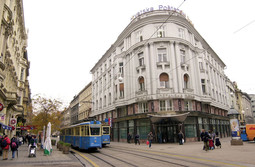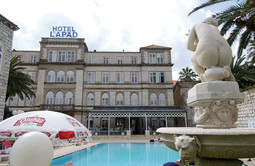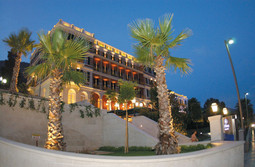Published in Nacional number 639, 2008-02-12
THE RESURRECTION OF SERBIAN BANKING IN ZAGREB
A bank for the new Serbian elite in Croatia
The Serbian National Council will found a bank that will draw on the tradition of the powerful pre-World War II Srpska banka (Serbian Bank) in Zagreb, whose former owners are leading a battle from the USA to restore seized property
 THE SEAT OF THE SRPSKA BANKA on the corner of Jurisiceva and Petrinjska streets in Zagreb is nowadays the administrative building of the Hrvatska postanska banka (Croatian Postal Bank) "The Srpska banka was founded in Zagreb in 1895 and the painstaking life's work of our grandfathers was invested into it. This labour was robbed first in the name of Croatian statehood by Ante Pavelic, and after him in the name of creating socialism by Josip Broz (Tito). Tudjman and Milosevic gave our remaining property to their associates. The current authorities are trying to sell that property to foreigners for a pittance."
THE SEAT OF THE SRPSKA BANKA on the corner of Jurisiceva and Petrinjska streets in Zagreb is nowadays the administrative building of the Hrvatska postanska banka (Croatian Postal Bank) "The Srpska banka was founded in Zagreb in 1895 and the painstaking life's work of our grandfathers was invested into it. This labour was robbed first in the name of Croatian statehood by Ante Pavelic, and after him in the name of creating socialism by Josip Broz (Tito). Tudjman and Milosevic gave our remaining property to their associates. The current authorities are trying to sell that property to foreigners for a pittance."
The cited text is part of the introduction to the Srpska banka web site, once a powerful pre-war financial institution in Croatia, on whose tradition, according to Milorad Pupovac, the president of the Serbian National Council, a future bank of the Serbian community in Croatia will draw, the founding of which was announced in Zagreb some ten days ago. Although the Srpska banka was forcefully shut down and its property robbed with the arrival of the Ustasha regime to power in Croatia in 1941, its former owners, more precisely their descendants, have founded an association of Srpska banka owners in the United States, registered a list of stockholders and chosen a management bodies and a board of directors of the bank based in Chicago. At its helm is Mihailo Saskijevic, a retired professor from Chicago, the descendant of one of the founders in the Srpska banka, who says that his mission is to renew the operations of the Srpska banka in Zagreb and that he too is involved in the project that was recently announced by leaders of the Serbian National Council.
That is why Pupovac's banking operation, besides an economic one, could also take on a political aspect and prompt questions related to the short, but very dark, period of Croatian history from 1941 to 1945, when the Ustasha authorities forcefully shut down the Srpska banka, and transferred its valuable real estate to the Postanska stedionica (Postal Savings Bank), now the Hrvatska postanska banka. In a telephone interview, Saskijevic told Nacional that the Srpska banka has property in Croatia estimated at about USD 100 million. The bank had been the owner of the building on the corner of Petrinjska and Jurisiceva streets, near Ban Jelacic square, now housing the seat of the Hrvatska postanska banka, it owned the hotels Lapad and Imperial in Dubrovnik, and the Lapad and Sumartin bathing areas. The Srpska banka was also the owner of attractive buildings on the Split waterfront now housing offices of T-HT (T-Croatian Telecom).
Saskijevic claims that this real estate belongs to the stockholders of the Srpska banka, registered in the USA. He said, however, that they were not interested in the money. "Our property was robbed in the most shameful way. It was seized by Pavelic, and Tudjman's regime used the law on the restoration of only that property seized after 1945 to make sure that it is never restored to us. We are interested only in honour, and that will be defended if the words Srpska banka are written in Cyrillic on the bank's building in Jurisiceva street."
Milorad Pupovac, the initiator of the idea to create a new Serbian bank, was unwilling to reveal the details of the new banking project, nor the people working on it. He would confirm only that the preparations were being led by himself and his associates, that a part of the future stockholders would be from abroad, but that he could say no more than what was published in the press some ten days ago. And it had been said then that Serbian institutions in Croatia had launched the establishment of their own commercial bank that would work on the economic revival of returnee areas. The formal exponents of the project are the Serbian National Council, the Privrednik Savings and Credit Cooperative (Stedno-kreditna zadruga Privrednik) and the Privrednik Serbian Economic Association (Srpsko gospodarsko drustvo Privrednik) in Croatia and it is based on the transformation of the existing savings and credit cooperative into the bank of the Serbian community in Croatia. The new bank of the Serbian community would be a development-oriented bank, and as such the first financial institution of that kind in Croatia since World War II.
 INITIATOR - Milorad Pupovac, the president of the Serbian National Council, says that the new bank's mission would be the economic revival of returnee areas During a meeting with the Serbian ambassador in Zagreb Radivoj Cveticanin, Pupovac said that a Serbian development bank would guarantee credit security for launching businesses, labour re-qualification, and secure grants for the education of needed professions. The operation has become an international one as it has been joined by the Government of Vojvodina. Pupovac visited Vojvodina Prime Minister Bojan Pajtic and a press release from that meeting said that the Vojvodina Executive Council would assist the project of transforming the savings and credit cooperative into the Serbian commercial bank by securing 45,000 euro for the acquisition of banking software.
INITIATOR - Milorad Pupovac, the president of the Serbian National Council, says that the new bank's mission would be the economic revival of returnee areas During a meeting with the Serbian ambassador in Zagreb Radivoj Cveticanin, Pupovac said that a Serbian development bank would guarantee credit security for launching businesses, labour re-qualification, and secure grants for the education of needed professions. The operation has become an international one as it has been joined by the Government of Vojvodina. Pupovac visited Vojvodina Prime Minister Bojan Pajtic and a press release from that meeting said that the Vojvodina Executive Council would assist the project of transforming the savings and credit cooperative into the Serbian commercial bank by securing 45,000 euro for the acquisition of banking software. Licences for all banks in Croatia are issued by the Croatian National Bank (CNB), and they say that they have not yet received a request to launch a new Serbian bank. As the legal deadline to transform savings and credit cooperatives runs out on 1 March, Pupovac and company have a little over two weeks to prepare the necessary documentation and collect the HRK 8 million that is the minimum equity capital required by law for the future bank.
Just the fact that a new bank is to be established in Croatia is news in itself, even if one disregards the fact that the future financial institution will have a Serbian denomination. Launching new banks in Croatia is legally possible, but it is known, however, that the CNB with Zeljko Rohatinski at its helm has for several years now not issued a single licence for a new bank, despite great interest. Given the existing CNB policy, which boils down to reducing, and not increasing the number of banks in Croatia, setting up a bank will not be an easy task for the Serbs in Croatia. Besides, this operation by the Serbian National Council could take on a political dimension, because its an open question how objective the CNB can be in evaluating a Serbian bank elaborate at a time when the international community and the EU are criticising Croatia because of the position of the Serbian minority and the return of refugees. That is why neither of the two possible answers coming out of the CNB will pass without comment. If Rohatinski allows the Serbs to set up a bank it would be the first bank go-ahead in the past four years. If the CNB sends the Serbs a rejection there is the danger of the politicization of the issue and boiling it down to the discrimination of Serbs in Croatia. Whatever the case, from the moment the future bank submits a request, the CNB has a deadline of six months within which to issue a licence or reject the future bankers. That means that by the start of September of this year the Srpska banka could get its first depositors.
Not all Serbs in Croatia are, however, delighted with Milorad Pupovac's idea. Simo Rajic, an eminent Zagreb attorney and former Member of Parliament, feels that setting up a bank with a national denomination is not a wise move right now. "The economic issues of Serbs have to be addressed by Croatian society and not by a commercial bank, which is in this case a project to amuse the masses." It is interesting that Simo Rajic, as a member of the Serbian National Minority Council of the City of Zagreb, is not included in Pupovac's banking project. "It is likely that for something of that sort, I am not a politically correct Serb", Rajic commented.
 Dubrovnik's Hotel Lapad belonged up to 1941 to the Srpska banka; Mihailo Saskijevic, the head of the association of stockholders of the Srpska banka in Chicago, was born in Dubrovnik and says that the hotel belongs to his family Economists too have varying opinion of the Serbian commercial initiative. Ljubo Jurcic doubts that a bank with a national denomination can survive without strong state support in today's market conditions. "The banking market is globalized, and in Croatia practically also monopolised and small banks can not compete with large ones. As soon as money is given to an institution based on political criteria, then it is no longer a bank. The idea of a Serbian bank is development oriented, so I feel that it would be better to set up a fund that would finance regional development. Because a fund can support development to the detriment of profitability, while a bank has to be profitable or there is no bank", says Jurcic.
Dubrovnik's Hotel Lapad belonged up to 1941 to the Srpska banka; Mihailo Saskijevic, the head of the association of stockholders of the Srpska banka in Chicago, was born in Dubrovnik and says that the hotel belongs to his family Economists too have varying opinion of the Serbian commercial initiative. Ljubo Jurcic doubts that a bank with a national denomination can survive without strong state support in today's market conditions. "The banking market is globalized, and in Croatia practically also monopolised and small banks can not compete with large ones. As soon as money is given to an institution based on political criteria, then it is no longer a bank. The idea of a Serbian bank is development oriented, so I feel that it would be better to set up a fund that would finance regional development. Because a fund can support development to the detriment of profitability, while a bank has to be profitable or there is no bank", says Jurcic.
Milorad Pupovac said that the future commercial bank would draw on the tradition of the former Srpska banka in Zagreb, but was unwilling to go into detail as to what that meant. An interesting explanation was put forward by Nives Rumenjak, a researcher at the Croatian Institute for History, who has spent years researching the historical and economic aspects of the Serbian minority in Croatia. Among other things, Nives Rumenjak is the author of a research paper entitled "The Beginnings of Economic Modernisation: The Serbian Financial Elite in Croatia at the Turn of the Century", in which she states that the Srpska banka in Zagreb, led by its founder Vladimir Matijevic, played a key role in the economic and national strengthening of the Serbian minority in Croatia at the turn of the 19th and 20th centuries. "There is no doubt as to the effects of the activities of Matijevic's circle, just as there is no doubt of his manipulation of Serbian nationalism for economic and financial ends", writes Nives Rumenjak. In her opinion, the chief purpose of the Srpska banka project was to concentrate the disunited Serbian capital in Croatia and Austria-Hungary exclusively into one central bank under the motto "birds of a feather". "Near the end of the 19th and at the start of the 20th century Serbian commercial banks, including the Srpska banka in Zagreb, often endeavoured by way of strong national propaganda to draw savings deposits and clients from their own national corpus, but also to take over the trade of merchants of other nationalities." Nives Rumenjak concludes that the Srpska banka in Zagreb, whose activities were based on the principle of exclusive Serbian nationalism, served the Serbian population from the then phased-out Military Frontier to adapt to the new times.
It is no surprise then that Pupovac's initiative is inspired by the Srpska banka, because the position of Serbs in Croatia today has numerous common points with the situation a hundred years ago. The Serbian minority resides for the most part in areas devastated by the war, without economic perspective, for which reason a large part of the refugees do not want to return. According to a Human Rights Watch report from 2006, not even a third of the 350,000 Serbs that fled during the war have returned to Croatia. As a result of poor economic conditions, only 65 percent of those who return remain in Croatia.
 DUBROVNIK, HOTEL IMPERIAL – Today's luxury hotel Imperial Hilton is owned by the Atlantska plovidba Compnay, but up to 1941 it belonged to the Srpska banka Zagreb, as did the Lapad and Sumartin bathing areas The same report says that Serbs in Croatian make up 4.5 percent of the population, which is about 200,000 people. That figure could be a good base of potential clients for a new Serbian bank. In the non-governmental Serbian Democratic Forum, they underline that refugee Serbs are not coming back because they are unable to get loans and financial incentives to launch enterprises. "The problem is in the guarantees that commercial banks are unwilling to accept, because the market value of the reconstructed houses and properties is small. On the average, returnees seek loans of HRK 100,000 to secure working capital for small family businesses, mostly for a herd of sheep or for the planting of a few hectares of orchard", says Obrad Ivanovic of the Serbian Democratic Forum. According to the research of that association about 10 thousand Serb returnees have indicated their interest in that kind of loan. A simple calculation shows that if a new Serbian bank were able to satisfy all of the returnee loan requests it could, in time, place a billion kuna in loans to Croatian Serbs.
DUBROVNIK, HOTEL IMPERIAL – Today's luxury hotel Imperial Hilton is owned by the Atlantska plovidba Compnay, but up to 1941 it belonged to the Srpska banka Zagreb, as did the Lapad and Sumartin bathing areas The same report says that Serbs in Croatian make up 4.5 percent of the population, which is about 200,000 people. That figure could be a good base of potential clients for a new Serbian bank. In the non-governmental Serbian Democratic Forum, they underline that refugee Serbs are not coming back because they are unable to get loans and financial incentives to launch enterprises. "The problem is in the guarantees that commercial banks are unwilling to accept, because the market value of the reconstructed houses and properties is small. On the average, returnees seek loans of HRK 100,000 to secure working capital for small family businesses, mostly for a herd of sheep or for the planting of a few hectares of orchard", says Obrad Ivanovic of the Serbian Democratic Forum. According to the research of that association about 10 thousand Serb returnees have indicated their interest in that kind of loan. A simple calculation shows that if a new Serbian bank were able to satisfy all of the returnee loan requests it could, in time, place a billion kuna in loans to Croatian Serbs.
And while Pupovac has announced that the new bank would be oriented to development, there need be no doubt that it would be conceived above all on real economic foundations. Otherwise is could not survive in a competitive banking market. Besides, in order to obtain an operation licence from the CNB, the founders have to prove that the bank will operate successfully and cite the market niche on which they will base their operations. And these are, evidently, small Serbian businesses in the parts of Croatia that are defined as areas of special state care. It may be concluded from the Serbian banking initiative that the Serbian community is not satisfied with the treatment they are getting from the state, and that they have decided to take the reins of reconstruction into their own hands. And so parts of Croatia along the eastern frontier could soon become areas of special Serbian care.
'We want the name of the bank to be in Cyrillic letters'
Mihailo Saskijevic has registered a list of stockholders of the Srpska banka in Chicago. He says that he is not interested in the money, only in the honour. "And that will be defended if the words Srpska banka are written in Cyrillic on the bank's building in Jurisiceva street", says Saskijevic.
Latest news
-
28.10.2010. / 14:15
'A profitable INA is in everyone's interest'
-
28.10.2010. / 09:38
Sanader’s eight fear SDP — Won’t bring down Government
-
21.10.2010. / 15:02
Interior Ministry turned a blind eye on Pukanic assassination
-
20.10.2010. / 09:34
Barisic could bankrupt HDZ



